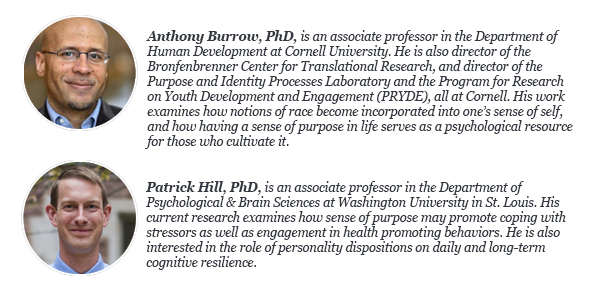A Sense of Purpose Can Support Teen Mental Health
Editor’s Note: Recently, the National Scientific Council on Adolescence (NSCA), housed at the Center for the Developing Adolescent at University of California Los Angeles, released a report that looks at the importance of purpose during adolescence. PolicyLab faculty member Dr. Rhonda Boyd is a member of the NSCA along with Drs. Burrow and Hill who are co-authors of the report.

Adolescence–the years between about 10 to about 25–is an essential time to help young people proactively build positive mental health and well-being. And research tells us one effective tool for youth to build positive mental health is a sense of purpose.
What is Purpose
Purpose is a forward-looking life aim that guides our behaviors and decisions. And it is overwhelmingly positive for everyone. This is especially true during adolescence, when we are establishing our values, goals, and identity and developing our abilities to consider the needs of others and to make a meaningful impact on the world around us.
To reap the benefits of purpose, we don’t have to define a specific activity or articulate a particularly grandiose aim. A sense of purpose–the perception and feeling that one’s life has a direction that guides daily engagements–can make a significant difference.
Why Purpose is Beneficial
The benefits of purpose comprise a long list: Adolescents with a greater sense of purpose are happier, healthier and more motivated. Having purpose can help youth identify personal goals (such as volunteering, artistic endeavors, science, sports, career, or social justice movements) and motivate them to work toward those goals. Asking a young person to reflect on their values, goals and purpose can increase their goal directedness and life satisfaction. Purpose can support resilience, too, offering hope and helping young people persist in finding ways around obstacles in their lives.
Purpose is also broadly protective of youth mental health–youth who feel a sense of purpose are less likely to be depressed or to have suicidal thoughts. And purposeful adolescents are less likely to engage in dangerous risk-taking like using alcohol and other drugs or engaging in violence. Having a sense of purpose can even buffer against negative impacts of social media, making young people less vulnerable to concern about “likes” on social platforms.
For adolescents from underserved groups, purpose serves a particularly protective role. Youth in poverty who have a greater sense of purpose are less likely to engage in negative behavior such as bullying that can be associated with the stresses of poverty. And purpose can limit the mental health consequences (for example, suicide ideation) for young people who experience racism.
How Young People Cultivate Purpose
The benefits to youth of having a sense of purpose are clear, but as adults, we can’t give young people a sense of purpose. We can, however, help provide the support and opportunities they need to cultivate their own unique sense of purpose.
Extracurricular activities or clubs, volunteering for a cause, or learning a skill outside of the standard school curriculum with help from supportive adults, schools, and communities are all ways that young people can explore their interests and skills, try new experiences, and learn through trial and error.
When a young person’s purpose is supported by the opportunities within their family and community environments, that purpose is more likely to persist and to contribute to their well-being. For example, a young person interested in writing poetry might find it easier to cultivate their purpose if they are part of a community with a library, poetry readings, writing classes, and adult and peer mentors with shared interests.
With the right support, the experience of being part of a marginalized group can sometimes galvanize a young person’s sense of purpose, as they see inequities and injustices and want to support others.
Finally, for many adolescents, social media provides a forum and opportunity for developing a sense of purpose and contributing to the world. The resources and connections young people make online can provide information and opportunities to discover and explore new interests and to collaborate with peers and mentors in ways that may not be feasible in their own community and cultural settings.
How Adults Can Help Youth Cultivate a Sense of Purpose
Ensure that all young people have a range of educational, extracurricular, and vocational opportunities to explore their purpose in healthy and safe settings.
Provide financial resources where possible and advocate for additional resources to support youth to explore new opportunities and interests.
Provide emotional support as young people navigate the trial and error, achievements and setbacks of cultivating purpose.
Help youth find and connect with online and community resources like local clubs or volunteer positions that provide opportunities to cultivate purpose.
Prioritize programs and policies that support parents to provide a healthy and safe home environment to help their children explore purpose.
Increase opportunities for vocational training and living wage jobs.
Create and support opportunities for youth to reflect on and share their purpose with others.
We know that purpose affects a wide range of healthy developmental outcomes. But more research is needed to help us understand the specific kinds of programs, policies and support that most effectively help young people cultivate a sense of purpose.
For example, research shows that more meaningful social connections are related to having a greater sense of purpose. But can programs that intentionally expand a young person’s social networks help young people develop a sense of purpose?
Additionally, the kinds of support that can best help young people as they cultivate their sense of purpose may vary across individuals. Additional research could help us understand how to tailor programs to equitably support purpose for young people from diverse backgrounds.
Finally, the more we can identify the elements that help lay the groundwork for youth to cultivate purpose, the more specific recommendations we can provide to policymakers to help them prioritize resources for parents, schools, communities and other youth-facing organizations that help young people develop their purpose.
